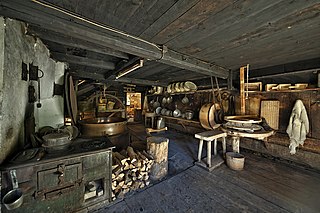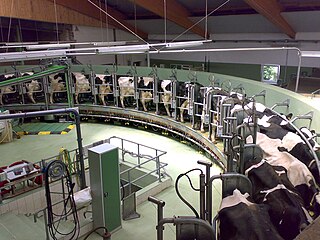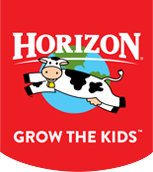
A dairy is a place where milk is stored and where butter, cheese and other dairy products are made, or a place where those products are sold. It may be a room, a building or a larger establishment. In the United States, the word may also describe a dairy farm or the part of a mixed farm dedicated to milk for human consumption, whether from cows, buffaloes, goats, yaks, sheep, horses or camels.

A farm is an area of land that is devoted primarily to agricultural processes with the primary objective of producing food and other crops; it is the basic facility in food production. The name is used for specialized units such as arable farms, vegetable farms, fruit farms, dairy, pig and poultry farms, and land used for the production of natural fiber, biofuel, and other commodities. It includes ranches, feedlots, orchards, plantations and estates, smallholdings, and hobby farms, and includes the farmhouse and agricultural buildings as well as the land. In modern times, the term has been extended to include such industrial operations as wind farms and fish farms, both of which can operate on land or at sea.

Animal husbandry is the branch of agriculture concerned with animals that are raised for meat, fibre, milk, or other products. It includes day-to-day care, management, production, nutrition, selective breeding, and the raising of livestock. Husbandry has a long history, starting with the Neolithic Revolution when animals were first domesticated, from around 13,000 BC onwards, predating farming of the first crops. During the period of ancient societies like ancient Egypt, cattle, sheep, goats, and pigs were being raised on farms.

In agriculture, rotational grazing, as opposed to continuous grazing, describes many systems of pasturing, whereby livestock are moved to portions of the pasture, called paddocks, while the other portions rest. Each paddock must provide all the needs of the livestock, such as food, water and sometimes shade and shelter. The approach often produces lower outputs than more intensive animal farming operations, but requires lower inputs, and therefore sometimes produces higher net farm income per animal.

Dairy farming is a class of agriculture for the long-term production of milk, which is processed for the eventual sale of a dairy product. Dairy farming has a history that goes back to the early Neolithic era, around the seventh millennium BC, in many regions of Europe and Africa. Before the 20th century, milking was done by hand on small farms. Beginning in the early 20th century, milking was done in large scale dairy farms with innovations including rotary parlors, the milking pipeline, and automatic milking systems that were commercially developed in the early 1990s.

Bovine somatotropin or bovine somatotrophin, or bovine growth hormone (BGH), is a peptide hormone produced by cows' pituitary glands. Like other hormones, it is produced in small quantities and is used in regulating metabolic processes. Scientists created a bacterium that produces the hormone somatotropin which is produced by the cow's body after giving birth and increases milk production by around 10 percent.

Dairy cattle are cattle bred with the ability to produce large quantities of milk, from which dairy products are made. Dairy cattle generally are of the species Bos taurus.
There are different systems of feeding cattle in animal husbandry. For pastured animals, grass is usually the forage that composes the majority of their diet. In turn, this grass-fed approach is known for producing meat with distinct flavor profiles. Cattle reared in feedlots are fed hay supplemented with grain, soy and other ingredients to increase the energy density of the feed. The debate is whether cattle should be raised on fodder primarily composed of grass or a concentrate. The issue is complicated by the political interests and confusion between labels such as "free range", "organic", or "natural". Cattle raised on a primarily foraged diet are termed grass-fed or pasture-raised; for example meat or milk may be called grass-fed beef or pasture-raised dairy. The term "pasture-raised" can lead to confusion with the term "free range", which does not describe exactly what the animals eat.

Free range denotes a method of farming husbandry where the animals can roam freely outdoors for at least part of the day, rather than being confined in an enclosure for 24 hours each day. On many farms, the outdoors ranging area is fenced, thereby technically making this an enclosure, however, free range systems usually offer the opportunity for the extensive locomotion and sunlight that is otherwise prevented by indoor housing systems. Free range may apply to meat, eggs or dairy farming.
Animal Outlook, formerly known as Compassion Over Killing (COK), is a nonprofit animal advocacy organization based in Washington, D.C. It is headed since May 2021 by Executive Director Cheryl Leahy, who succeeded Erica Meier. Formed in 1995, as a high school club, their primary campaigns are to advocate against factory farming and promote vegan eating. While the group welcomes those who are interested in animal welfare who eat meat, it encourages a transition to a plant-based diet.

Dean Foods was an American food and beverage company and the largest dairy company in the United States. The company's products included milk, ice cream, dairy products, cheese, juice, and teas. It processed milk in the United States under a number of regional and national brands. Founded in 1925, the company filed for Chapter 11 bankruptcy in 2019, and its assets were acquired by several buyers in 2020.

Automatic milking is the milking of dairy animals, especially of dairy cattle, without human labour. Automatic milking systems (AMS), also called voluntary milking systems (VMS), were developed in the late 20th century. They have been commercially available since the early 1990s. The core of such systems that allows complete automation of the milking process is a type of agricultural robot. Automated milking is therefore also called robotic milking. Common systems rely on the use of computers and special herd management software. They can also be used to monitor the health status of cows.

Clover Sonoma, formerly Clover Stornetta Farms is a dairy company located in Sonoma County, California, along the Pacific coast in Northern California. It is a brand that has existed since the early 1900s, when the Petaluma Cooperative Creamery served the city of Petaluma. In 1977, Clover Stornetta Farms, Inc. was formed from the joining of two separate companies: Stornetta's Dairy and the Petaluma Cooperative Creamery. Clover Sonoma currently has farms in Sonoma County, Marin County, and Mendocino County, California. In 2021, Clover Sonoma launched Clover the Rainbow, a sister dairy brand that makes a line of kids' organic yogurt smoothies.

Horizon Organic is an American company that produces organic milk and other organic food products. Largest supplier of organic milk in North America, its products are sold in supermarkets and grocery stores.
Agriculture in Idaho is an important part of the state's way of life and represents a substantial portion of the state's economy. 20% of Idaho's sales each year are generated by agriculture and food/beverage processing. In 2015, agricultural products were valued at $7,463,718,000, with slightly over half of that from the sale of livestock and dairy products. Cattle is the second largest agriculture sector of the state and Idaho is the third largest producer of milk and cheese in the United States. Although dairy plays a significant role in the economy, Idaho is most known for its potatoes. Idaho is the number one producer of potatoes in the nation and contributes to 32% of the country's production. Idaho has nearly 25,000 farms and ranches spread over 11.8 million acres of land that produces more than 185 different commodities. The state's production ranks in the top ten in the nation in nearly 30 of the commodities it produces.
Happy Cow Creamery is a family-owned dairy farm in Pelzer, South Carolina that bottles and sells its own milk on site from the farm's closed herd of grass-fed Holstein cattle. The creamery's whole milk, buttermilk and chocolate milk is sold in the farm's on-site store and through grocery, convenience and country stores in Upstate region of South Carolina. The milk is not homogenized and is low-temperature pasteurized and inspected by the State of South Carolina.
The Cornucopia Institute is a national food and farm policy 501(c)(3) non-profit watchdog group with the stated goal of upholding the integrity of organic, local, and other forms of alternative agriculture.

Agriculture has in the past been a major part of the economy of Wales, a largely rural country which is part of the United Kingdom. Wales is mountainous and has a mild, wet climate. This results in only a small proportion of the land area being suitable for arable cropping, but grass for the grazing of livestock is present in abundance. As a proportion of the national economy, agriculture is now much less important; a high proportion of the population now live in the towns and cities in the south of the country and tourism has become an important form of income in the countryside and on the coast. Arable cropping is limited to the flatter parts and elsewhere dairying and livestock farming predominate.
A pasture wedge graph or feed wedge is a farm management tool used by dairy farmers for the purposes of managing pasture. It takes the form of a bar graph, that shows the amount of feed available in a pasture over time, and is therefore shaped as a declining wedge.
The dairy industry in the United States includes the farms, cooperatives, and companies that produce milk, cheese and related products such as milking machines, and distribute them to the consumer. By 1925, the United States had 1.5-2 million dairy cows, each producing an average of 4200 lb of milk per year. By 2007, there were 9.1 million dairy cows with an average milk production of over 20,000 pounds per year and eight pounds per gallon.













